
SOUTH32 today unveiled a one US cents per share final dividend (2019: 2.8c/share) following a difficult 2020 financial year in which – absent the commodities such as iron ore and platinum group metals (PGMs) that boosted the earnings of its peer group – revenue plummeted.
The group trades in unfashionable aluminium, manganese as well as metallurgical and thermal coals which have not experienced the supply deficits of other minerals as reflected in the firm’s 16% full-year revenue decline to $6.1bn for the year.
“A deterioration in commodity markets was the primary driver of the significant decline in profitability,” the company said in notes to its year-end numbers.
The outcome was a taxed loss of $65m which took account of $115m in impairments related to its manganese alloy operations. Post-period, South32 agreed to sell its TEMCO facilities in Tasmania to UK-based conglomerate, GFG Alliance.
After the firm’s share buy-back programme – suspended during the year with $121m of the $1.43bn programme still to run – and dividend payments, net cash fell to $298m as of July 1 from $504m a year ago.
The final dividend declaration was 77% of underlying earnings which were 81% lower at $193m after absorbing the impact of the de-recognition of tax benefits associated with the proposed sale of its South African Energy Coal (SAEC) business.
Commenting on the transaction during an analyst question and answer session, South32 CEO, Graham Kerr, said he was having “a good dialogue” with Eskom, the South African power utility which is an important customer for SAEC production.
The parties, along with Seriti Resources which is the selected buyer of SAEC, are hammering out a solution to the low fixed price contract between SAEC’s Wolverkrans Middelburg Complex (WMC) and Duvha power station.
“It hasn’t kept up with the way the world is moving,” said Kerr of the WMC/Duvha contract. “We, along with Seriti and Eskom will look at the whole coal package ,” he said of discussions. The transaction, which also requires competition and change of ownership approvals, is slated for completion at the calendar year-end, said Kerr.
Eskom was also at the centre of different contract discussions South32 was having on long-term electricity supply to its Hillside aluminium smelter. Kerr said the company was “never going to get” a repeat of the former supply agreement in which the power tariff rose or fell in proportion to aluminium prices on the London Metal Exchange.
“You should model it on the Mozal contract for cost base and structure,” said Kerr of the proposed new electricity contract under discussion with Eskom as well as the National Energy Regulator of South Africa (Nersa), the oversight regulatory body that has to give its approval to the contract.
BHP, the company which demerged assets to create South32, formalised a new contract with Mozal in 2010 removing the metal price linkage which was problematically recognised as an embedded derivative in Eskom’s books.
BUY-BACK
Peer group companies such as Anglo American, Rio Tinto and BHP have benefited from exposure to iron ore, platinum group metals and copper, the prices of which have flourished this year owing to supply deficits and interruptions.
As if to anticipate better times, South32 said it had extended the option of resuming the buy-back programme to September 2021. But its options were open on when the buy-back would be resumed. “Once the business is stabilised we will have the flexibility to come back in,” said Katie Tovich, CFO of South32 who added that the asymmetrical nature of Covid-19 economic recoveries around the globe was a complexity.
Said Kerr: “We are not building a war chest for M&A activity. We have extended the buy-back period so we can get back in.”
South32 had also targeted additional cost savings totalling $50m in its 2022 financial year having cut corporate costs $50m in the year under review.
Shares in the company eased 0.23% on the Australian Stock Exchange having fallen nearly a quarter over the last 12 months.











